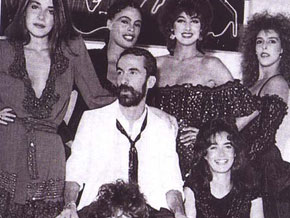In November 2010, the magazine "Joyce Pascowitch" brought an extensive report on the legendary Brazilian designer Markito. In January, The Cape also published a rescue of the famous couturier. And now in June, the "Beeshas do Brasil" column rescues Markito again – in the month that marks the 28th anniversary of his death – he passed away on June 4, 1983, a victim of HIV.
Marcus Vinícius Resende Gonçalves was born in 1952 in Uberaba, Minas Gerais. At the age of 12 he was already designing dresses and costumes for a local samba school. At the age of 18, in 1970, he arrived in São Paulo and went to work in the studio of a boutique.
But of course that was little for the young man's dazzling talent. Soon he started to have his own business, selling clothes with his personal brand. His creations were influenced by glam rock and glitter, as well as Dzi Croquettes – but without leaving aside the sophistication of haute couture.
Sequins were Markito's trademark. The end of the 70s, with the height of the disco era, established the designer once and for all, who went on to the new decade as the great master of modern fashion. In 1982, he was selling 300 dresses a month and managing 150 employees.
In the 1980s, everyone wanted to wear Markito. Among his famous clients were the actresses Sandra Bréa (who would also be a victim of AIDS in 2000), Mila Moreira, Maitê Proença, Sonia Braga, Christiane Torloni, Marília Pêra; the singers Simone, Gal Costa, Vanusa, Fafá de Belém; and even Xuxa Meneghel. "Markito was a stunning glass of champagne", says Marília Gabriela, the designer's friend and client. On the cover of the album she released as a singer in 1982, Marília wore one of his outfits.
Among the international women who wore their creations were stars such as Liza Minnelli, Diana Ross, Grace Jones, Bianca Jagger, Olivia Newton-John and Farrah Fawcett. At the Studio 54, in New York, and Regines, in Paris, clubs, his dresses stole the show.
A self-confessed workaholic, the designer worked nonstop, diversifying activities. He made clothes for different areas, including costumes for cinema – such as the film "Rio Babilônia" (82).
Markito would stay in the studio – in Jardins – from 9am to 21pm, and then he would throw himself into the effervescent nightlife of the time, dancing non-stop, with an enviable and inimitable flair. After all, it was the golden age of the late 70s and early 80s – exactly the transition from the disco era to the absurd glamor of the 80s.
In Brazil, in São Paulo, the setting was the Gallery nightclub, a temple of the rich and famous at the beginning of that decade. Vaporous women paraded aboard his creations, increasing his fame. His creations were sold in trendy stores such as Henri Bendels in New York and Fiorucci in São Paulo.
Regarding his sexuality, Markito was openly gay. However, there were many women who fell in love with him. The designer had a manly charm that platonically seduced women, whether famous clients or not. It would not be absurd to imagine that novelist Cassiano Gabus Mendes was inspired by Markito to create the character Jacques Leclair (Reginaldo Faria) for his soap opera "Ti-ti-ti" (1985/86). But Jacques only pretended to be gay to seduce customers, unlike Markito.
Unfortunately, Markito's trajectory was meteoric. He became the first famous name in Brazil to die from AIDS – then seen as a "gay plague". And it was at the Gallery that Markito said goodbye to Brazil. On April 5, 1983, he celebrated his 31st birthday there, receiving friends. Then he left for New York, the city he had chosen to die in.
He passed away on June 4, and was buried in Uberaba. In his hometown, the designer's sister, Monica Rezende Gonçalves, founded a museum to record his legacy. To visit, simply schedule a time. The contact telephone number is (34) 3333-7438.
Markito marked an epoch in fashion and forever inscribed his name in the olympus of the world's great designers, in addition to having lived his short, but stellar, existence intensely. An authentic Beesha from Brazil.



